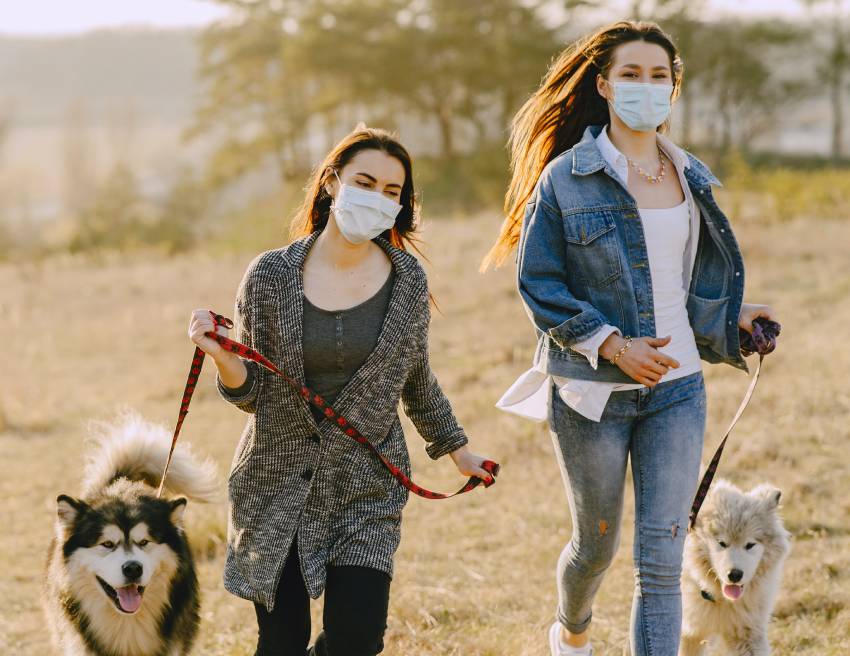Protect Yourself and Others from COVID-19 at Parks and Recreational Areas
We can all use some fresh air, relaxation, and physical activity to help keep our minds and bodies healthy. Visiting a park, walking trail, or other scenic open space can be a great help while dealing with the stressors that COVID-19 presents. By following some suggestions and guidelines, we can still unwind and be safe.
Don’t: Visit parks if you are sick or were recently exposed to COVID-19
- If you are sick with COVID-19, were recently exposed (within 14 days) to someone with COVID-19, or just don’t feel well, do not visit public areas including parks or recreational areas.
Do: Visit parks that are near you
Traveling long distances may contribute to the spread of COVID-19 because:
- Long travel may necessitate stopping along the way or being in close contact with other people.
- Travel may also expose you to surfaces contaminated with the COVID-19 virus.
Don’t: Visit crowded parks
- Do not visit areas where you cannot stay at least 6 feet away from others at all times.
Do: Prepare before you visit
- Ensure the location you want to visit is currently open to the public.
- Take along items you may need such as snacks, drinks, face mask, and hand sanitizer.

Stay safe and stop the spread of COVID-19
Do: Stay 6 feet away from others (“social distancing”) and take other steps to prevent COVID-19
If a park, beach, or recreational facility is open for public use, visiting is safe as long as you practice social distancing and everyday steps such as washing hands often and covering coughs and sneezes.:
- Stay at least six feet from others at all times. Do not go into crowded areas.
- Avoid gathering with others outside of your household.
- Wash hands often with soap and water for at least 20 seconds, especially after going to the bathroom, before eating, and after blowing your nose, coughing, or sneezing.
- Bring hand sanitizer with at least 60% alcohol to use if soap and water are not available.
Local parks
Local and state authorities will determine whether parks and other recreational facilities near you will be open. Check in advance to be sure you know which areas or services are open, such as bathroom facilities and concessions. Be prepared and bring what you need with you.
National parks
The National Park Service will decide on a park-by-park basis whether a national park will be open. Check with individual parks for specific details since visitor centers, concessions, and bathroom facilities may be closed.
Playgrounds
Don’t: Use playgrounds
Do not use playgrounds, including water playgrounds or splash pads.
Using playgrounds might lead to the spread of COVID-19 because:
- They are often crowded and could easily exceed recommended guidance for gatherings.
- It can be challenging to keep surfaces clean and disinfected.
- The virus can spread when young children touch contaminated equipment and then touch their hands to their eyes, nose, or mouth.
Sports
Don’t: Participate in organized sports
Organized sports such as soccer, basketball, and football that are held on park fields, open areas, and courts are not recommended. These activities typically require athletes who are not from the same household or to be in close proximity, which increases their potential for exposure to COVID-19.
Swimming
Do: Keep space between yourself and others
There is no evidence that COVID-19 can be spread to humans through the water. Proper operation, maintenance, and disinfection (with chlorine or bromine) of pools should kill COVID-19.
If you are not sick or experiencing symptoms of COVID-19, it is safe to use swimming pools as long as steps are taken to reduce the spread of COVID-19:
- Practice social distancing by staying at least six feet (two meters) from others.
- Avoid gatherings of more than 10 people.
- Keep your hands clean by washing hands with soap and water, especially after going to the bathroom, before eating, and after blowing your nose, coughing, or sneezing. Use an alcohol-based hand sanitizer that contains at least 60% alcohol if soap and water are not available.
Beaches or other swimming areas
State and local authorities will decide whether natural bodies of water and beaches or swimming areas will be open. Please check with individual beaches or swimming areas for specific details and practice the same protective measures as recommended for swimming in a pool.